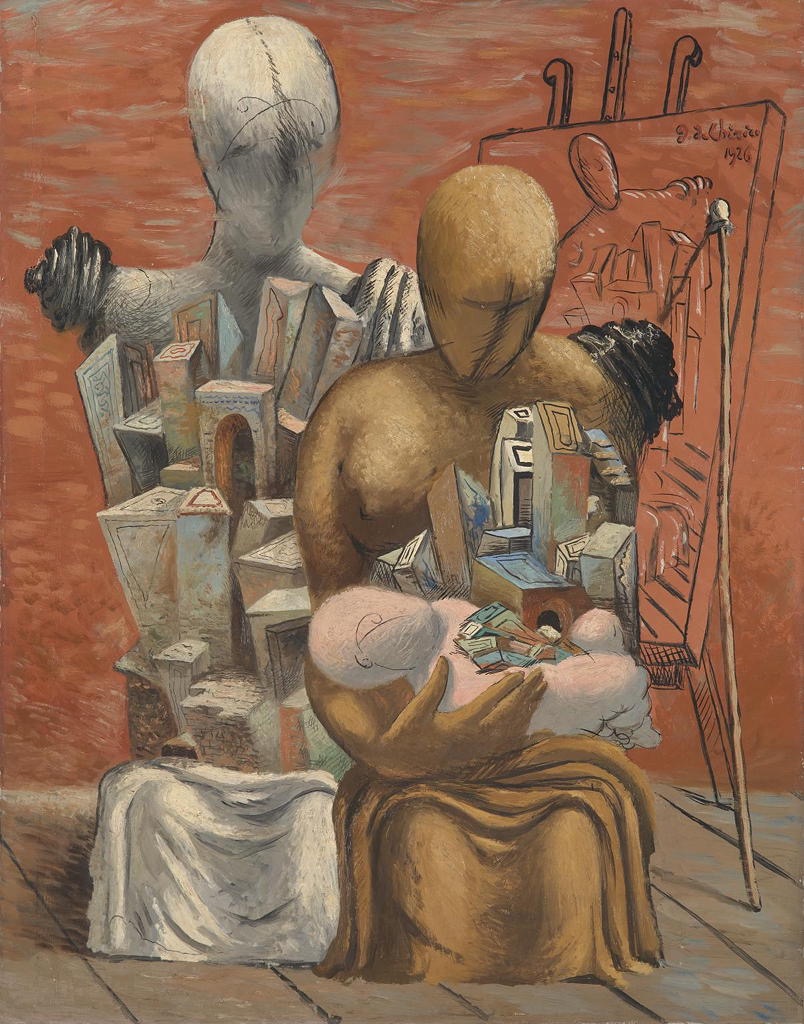Paradigming

Giorgio de Chirico: The Painter’s Family (1926)
" … from his future turned dystopian on him, he might caution others to be wary …"
©2022 by David A. Schmaltz - all rights reserved
I want to have written a book of unique form rather than just another copy cat derivative work. All books seem very much alike in that they feature a number of pages tucked between covers, called "boards" in the trade, but the old adage that you can't tell a book by its cover also holds true for a book's form. A book is not simply a book in that it also holds the potential to transcend what the term book meant before this one came along. Forever after, history will be divided into two components, before this book and after this book. That book's the one, if I'm honest with myself and with my readers, I want to have written, to be writing. I want to believe that's the book I'm presently creating and also the book I have up in manuscript galleys awaiting publication, a great treasure awaiting discovery. A part of me, the rational, more-or-less sane part, understands that this future probably does not stand before me, yet my hope still springs eternal. The result seems to be a generic Want To, Have To, but Can't Dilemma, in no way exceptional, for it might well be that everybody, every writer, painter, chef, and teacher aspires for just this sort of impact and also that it cannot ever be engineered, no matter what. There are good reasons for this to be the case.
First, such Paradigming can only occur after the fact. Before Turner invented impressionism, El Greco dabbled in it without knowing he did. Neither set about to invent impressionism exactly, though both doubtless understood that they created something different. They might not have understood that that difference amounted to genius, for at the time no template existed with which to compare what many described as madness with a paradigm of genius. They might have even characterized their work's difference as deficiency, a difficulty rather than a benefit, something to work on getting over. They were in fact Paradigming without knowing it, a probably necessary condition, because creating's not like engineering. An artist does not dabble in deliberate variation but inspiration. Whether an instance of inspiration might manifest in any way resembling what anyone, including the artist, might recognize as genius, lies in the future at the time of creation, even completion. Paradigming's a future state, never a present one.
Next, a paradigm's not the property of its producer. Impressionism was somebody else's label for what impressionists produced, not the impressionists' term. The benefits of self promotion aside, most shifts aren't actually noticed by the ones responsible for them. There have been exceptions, but the normal way breakthroughs happen has always been by accident. I believe that the formal explanation for them is Happy Accident. The creator's just farting around, doing what he does, perhaps that time with a little trivial-seeming twist which later, turns out to have been significant. There was no border crossing evident when the artist nudged his work over it. The achievement was ex post facto, not beforehand influential. Therefore, it remains paradoxical that anyone, artist, statesman, or milkman, could ever create a new paradigm. Paradigming's for dreaming rather than for realization.
Yet still, that desire burns and distracts. An Author might find it a struggle to describe what he's created because it very likely seems to him that his work's unique, not honestly comparable to any other. He, of course, long ago grew bored to death of the content, but he still remembers the flush of excitement creating it produced and he imagines a similar experience might await every reader, too, such that a groundswell of appreciation might result. It might even be that modern history gets altered, hewn into two constituent parts, before this book and after. The Author might even live to witness that schism and live to regret the resulting notoriety, the society his success forced him into. He was once an unknown entity, typing while overlooking the center of the universe each morning, back before he became the father of his paradigm shift. Then, from his future turned dystopian on him, he might caution others to be wary of Paradigming. Be careful what you wish for, Authoring's different.


